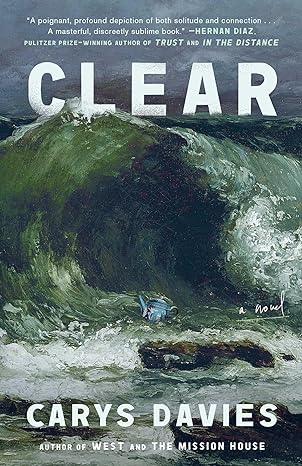4 Stars
This short, understated but powerful novel is set in 1843 against a backdrop of upheaval caused by the Disruption of 1843 and the Highland Clearances.
John Ferguson has broken away from the Church of Scotland and become a part of the Free Church of Scotland. Without a church or a manse, he finds himself virtually penniless. To earn money to support himself and his wife Mary, he seizes an opportunity to travel to a remote island to evict the last remaining tenant so the landowner can dedicate the island to sheep. Ill-suited and ill-prepared for the task, John is brought to the island. After one night, he has an accident which leaves him injured. He is found by Ivar, the tenant John is to remove, who nurses him back to health.
Ivar does not understand Scots or English; he speaks an ancient dialect called Norn, once spoken on the Orkney and Shetland islands. Initially communication between the two men is difficult, but as John embarks on learning Ivar’s language, a transformative friendship develops.
The novel alternates between the perspectives of John and Ivar, and occasionally Mary. The personalities of each are developed. The traits that stand out for me are Ivar’s reticence, generosity, and sense of boyish wonder, John’s sincerity and worldly naivety, and Mary’s practicality and supportiveness.
John is to spend only a month on the island before a boat returns for him and Ivar. This short duration means that John’s recovery, his learning of Ivar’s language, and the development of their friendship happens rather quickly. As a result, what happens feels rushed and strains credulity. I would also have liked a deeper probe into John’s psyche; we come to know Ivar’s emotions but we need more of John’s internal turmoil as he grapples with his emotions and conscience. I did appreciate the references to John and Mary’s “sometimes unsuccessful lovemaking” and Mary’s fantasizing about living with her friend Alice “in a small house of their own”; both suggest an explanation for the paths chosen in the end.
There is considerable tension as John’s time on the island shortens. How can he break the news to Ivar of his official mission to the island? The existence of the pistol casts a shadow. And then there’s the mission that Mary sets for herself. There’s a sense of foreboding that made me think this would not end well.
On the other hand, there are touches of humour. The story of John and Mary’s meeting over dentures is comic; I loved her thinking that “It seemed like an exceptionally bad piece of luck, to lose so many teeth in a single year.” And then there’s John’s thinking that Mary describes her husband as serious, “by which, he was fairly sure, she meant strict and humorless and dull and generally Presbyterian.”
There is much to admire in the book. For example, the title is perfect. Not only does it refer to the Clearances, but it emphasizes the clarity all three characters achieve. They come to understand much about each other and themselves. The lyrical prose is beautiful and evocative, painting vivid pictures of the windswept island.
I loved this novel. For various reasons it made me think of other books I’ve read: its subject matter reminded me briefly of Sweetland by Michael Crummey and the writing style is reminiscent of that of Claire Keegan. I even thought of The Wildes by Louis Bayard which suggests that Oscar Wilde’s life would have been so different if his wife Constance had made the choice Mary makes at the end of Clear.
I think this is a title I will add to my to-re-read list. I would like to savour the gorgeous prose and to have my faith in human compassion restored once again.

No comments:
Post a Comment